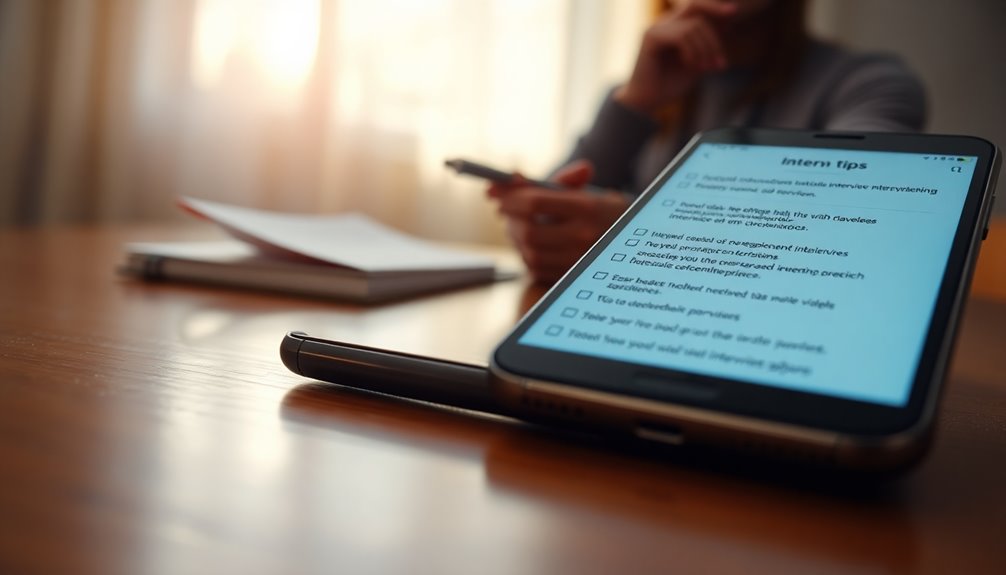Job Interview
Physician Assistant Job Interview Questions: 12 Answers That Will Land You the Job!
Optimize your chances of success with essential physician assistant interview questions and answers; discover the secrets that could land you the job!

To ace your physician assistant job interview, you must anticipate common questions and prepare thoughtful answers. Focus on showcasing your skills in communication, empathy, and problem-solving, as these are essential for effective patient care. Use the STAR method to address situational queries and illustrate your experiences. It's important to demonstrate your knowledge of the role's responsibilities and understand the scope of practice relevant to the position. Don't forget to have insightful questions ready for your interviewers. Keeping these pointers in mind will not only boost your confidence but will also set you up for success in your interview journey.
Key Takeaways
- Prepare for common PA interview questions by researching typical scenarios and responses to demonstrate your readiness and fit for the role.
- Utilize the STAR technique to structure answers for situational questions, showcasing problem-solving and critical thinking skills effectively.
- Highlight your communication and active listening abilities to illustrate your capability in building rapport with patients and collaborating with healthcare teams.
- Convey your commitment to lifelong learning and professional development, indicating your desire to grow within the PA role and contribute meaningfully.
- Ask insightful questions about the facility and its culture to show genuine interest and engage with the interviewers on a deeper level.
Overview of Physician Assistant Role

As a Physician Assistant (PA), you play an indispensable role in patient care, working alongside physicians to diagnose and treat illnesses. Your responsibilities include conducting thorough patient examinations, ordering and interpreting laboratory tests, and assisting in surgeries. With your medical knowledge, you collaborate closely with primary physicians to create and implement effective treatment plans tailored to each patient's needs.
In the dynamic environment of healthcare, you're a crucial member of the healthcare team, ensuring that patients receive extensive care. Your ability to communicate clearly with both patients and colleagues enhances the overall treatment process. You must also stay informed about state regulations, as the scope of practice for PAs can vary depending on local laws and healthcare settings.
To practice as a PA, you've completed a master's degree in PA studies from an accredited program and passed the Physician Assistant National Certifying Exam (PANCE). This rigorous training equips you with the skills necessary to provide high-quality care. By understanding your role and responsibilities, you contribute to the well-being of your patients and the efficiency of the healthcare system.
Common Interview Questions

When preparing for your PA job interview, expect to answer essential questions about your career motivations and understanding of the role. You'll likely encounter behavioral interview techniques, such as the STAR method, to showcase your experiences. Be ready to discuss how you handle teamwork dynamics and maintain emotional health in a demanding environment.
Essential Questions to Expect
Preparing for a Physician Assistant interview means you should be ready for a variety of essential questions that assess your fit for the role. Expect common interview questions that focus on your commitment to patient care, professional development, and interpersonal skills. Here are some key areas to prepare for:
| Question Category | Example Question | Purpose |
|---|---|---|
| Motivation | Why did you choose to become a Physician Assistant? | Gauges passion for the profession |
| Conflict Resolution | Can you describe a time you resolved a conflict with a colleague? | Assesses interpersonal skills |
| Understanding of the Role | What do you believe are the key responsibilities of a PA? | Evaluates your grasp of PA duties |
| Stress Management | How do you handle stress in a fast-paced environment? | Tests coping strategies and growth mindset |
| Professional Development | What are your plans for ongoing professional development? | Explores commitment to continuous learning |
Behavioral Interview Techniques
Behavioral interview techniques can really make or break your chances in a Physician Assistant interview. These methods often utilize the STAR technique—Situation, Task, Action, Result—to help you provide structured and detailed answers. Be prepared to discuss your teamwork experiences, as interviewers want to see how you collaborate with others in a clinical setting.
Expect questions about conflict resolution, where you'll need to demonstrate how you handle disagreements or stressful situations effectively. Highlighting your communication skills is essential, as PAs must convey information clearly to both patients and team members.
To stand out, prepare specific examples that showcase your problem-solving abilities. Think of a challenging scenario you faced and how you navigated it, emphasizing the outcomes. Practice articulating these experiences, as it helps you reflect on your qualifications and suitability for the PA role.
Addressing Career Motivations
Understanding your career motivations is essential in a Physician Assistant interview. You'll want to convey your passion for patient care and your commitment to improving health outcomes. Reflect on personal experiences that influenced your decision to pursue this path, such as previous healthcare interactions or mentorship from PAs.
You can also highlight the collaborative nature of the PA profession. Emphasizing teamwork shows you value working with others to achieve the best patient care possible. Share specific examples of how you've adapted to challenges in healthcare; this indicates a proactive approach to patient management.
Lastly, be prepared to discuss your long-term career goals. Explain how the PA position aligns with your aspirations for ongoing professional development and specialization.
Here's a simple table to illustrate key points about addressing career motivations:
| Key Aspect | Importance | Example |
|---|---|---|
| Passion for Patient Care | Shows genuine commitment | Discuss a meaningful patient interaction |
| Collaborative Nature | Highlights teamwork importance | Share an experience working with a healthcare team |
| Proactive Approach | Indicates resilience in patient management | Talk about overcoming a specific challenge |
| Professional Development | Aligns with long-term career aspirations | Outline plans for specialization |
Key Qualities of Successful PAs

To succeed as a Physician Assistant, you need effective communication skills that help you connect with patients and collaborate with your healthcare team. Strong team collaboration is essential, as it guarantees everyone is on the same page when it comes to patient care. By honing these qualities, you'll enhance both patient satisfaction and treatment outcomes. Additionally, cultivating emotional alignment can significantly improve your interactions with patients and colleagues, fostering a more positive work environment.
Effective Communication Skills
Effective communication skills are one of the top qualities that make a physician assistant successful. You'll need to convey complex medical information to patients in a way they can understand, ensuring they grasp their diagnosis, treatment options, and care plans. For effective patient education, you must adapt your communication style to diverse backgrounds and literacy levels, using jargon-free language and visual aids when necessary.
Active listening is essential, allowing you to fully comprehend patient concerns and needs. This fosters a trusting patient-provider relationship, which is fundamental in healthcare. Your interpersonal communication skills will also enable you to collaborate effectively with healthcare teams, enhancing patient care through clear and respectful exchanges of information.
Moreover, empathy in your communication is critical. When you show understanding and compassion, it helps you build rapport with patients, which ultimately improves their satisfaction and compliance with treatment plans. By mastering these effective communication skills, you not only become a better PA but also contribute considerably to the overall healthcare experience for your patients. Additionally, understanding developmental milestones can aid in tailoring your communication to better address the needs of pediatric patients and their families.
Strong Team Collaboration
Fostering strong team collaboration is fundamental for physician assistants, as it directly impacts patient care and outcomes. As a PA, your ability to work well with others is significant. You'll need to cultivate strong interpersonal skills and effective communication to enhance teamwork within your healthcare setting. Here are three key aspects to reflect on:
- Active Listening: By actively listening, you can understand and address the concerns of both colleagues and patients, leading to better outcomes. This helps in building rapport and mutual respect among team members.
- Clinical Expertise Contribution: During multidisciplinary team meetings, share your insights based on your clinical expertise. This fosters a culture of shared knowledge and best practices, fundamental for improving patient care.
- Conflict Resolution: Utilize effective conflict resolution strategies. Open communication and collaborative problem-solving are essential for maintaining positive team dynamics and ensuring smooth operations in the healthcare environment.
Importance of Interview Preparation

In the competitive landscape of healthcare, thorough interview preparation is essential for success. It allows you to anticipate common PA interview questions, enabling you to craft thoughtful and strategic responses that align with the job expectations. By familiarizing yourself with these questions, especially those related to teamwork and your commitment to patient care, you can present yourself as a strong candidate.
Researching the hiring facility and understanding its contributions to the community can further demonstrate your commitment and interest in the role. This knowledge sets you apart and shows you're genuinely invested in the position. Practicing mock interviews enhances your confidence and reduces anxiety, improving your overall performance when it's time for the real thing.
Additionally, preparing insightful questions for your interviewers reflects your proactive nature and genuine interest in how you'll fit within the healthcare team. This level of preparation not only boosts your confidence but also positions you as a candidate who is serious about contributing positively to the organization. Ultimately, effective interview preparation is vital in making a lasting impression and securing the position you desire. Furthermore, understanding employer-sponsored retirement accounts can provide you with insights on long-term financial planning, which is crucial for your career stability.
Stress Management Techniques

Managing stress is essential for anyone in the healthcare field, especially for physician assistants who often face high-pressure situations. Effective stress management techniques can enhance your emotional regulation and overall job performance. Here are three key strategies to reflect upon:
- Deep Breathing Exercises: These can help reduce stress levels by promoting relaxation and lowering your heart rate. Practicing deep breathing during tense moments can help you maintain composure.
- Regular Breaks: Scheduling brief breaks during your shifts can considerably improve mental clarity and reduce fatigue. Even a few minutes away from the task at hand can refresh your mind and enhance your focus.
- Physical Activities: Engaging in regular exercise releases endorphins, which improve your mood and decrease stress. Incorporating physical activities into your routine can have a profound impact on your ability to manage stress effectively.
Additionally, developing a support network among colleagues fosters open communication about stress. Sharing coping strategies not only creates a healthier work environment but also promotes resilience in the face of challenges. Implement these techniques to navigate the demands of your role as a physician assistant successfully.
Ethical Considerations in PA Practice

Ethical considerations are at the heart of physician assistant (PA) practice, influencing every decision you make in patient care. Key elements like maintaining patient confidentiality and ensuring informed consent are critical for building trust and supporting patient rights. As a PA, you'll often face ethical dilemmas that challenge your professional integrity while advocating for your patients' needs.
Here's a quick breakdown of some ethical considerations you'll encounter:
| Ethical Consideration | Description | Importance |
|---|---|---|
| Patient Confidentiality | Protecting patient information from unauthorized access | Fosters trust and compliance with laws |
| Informed Consent | Ensuring patients understand their treatment options | Empowers patients in decision-making |
| Professional Integrity | Adhering to ethical guidelines in practice | Reinforces trust in the healthcare system |
| Advocating for Patients | Supporting patients' rights and needs | Enhances patient care and outcomes |
| Continuous Education | Staying updated on evolving ethical standards | Prepares you for complex patient situations |
Teamwork and Collaboration Skills

Building on the foundation of ethical considerations in PA practice, effective teamwork and collaboration skills are essential for delivering high-quality patient care. In a healthcare setting, you'll often work alongside physicians, nurses, and other professionals. By fostering a collaborative environment, you can enhance patient outcomes through shared expertise. Here are three key aspects to focus on:
- Communication: Employ active listening and clear verbal exchanges to guarantee all team members are informed and engaged. This fosters a sense of partnership and shared responsibility.
- Conflict Resolution: Develop skills to address disagreements constructively. This keeps the atmosphere positive and promotes teamwork, allowing diverse perspectives to contribute to patient care.
- Interdisciplinary Participation: Regularly engage in multidisciplinary team meetings to strengthen dynamics and promote a culture of mutual respect. Your unique clinical insights as a PA can help coordinate care for complex patient needs. Additionally, understanding effective teamwork can lead to improved collaboration and patient outcomes.
Patient Care Best Practices

Delivering high-quality patient care relies heavily on best practices that prioritize thorough assessments, effective communication, and ongoing support. You'll want to focus on extensive patient assessments, gathering detailed medical histories and performing physical exams to guarantee accurate diagnoses. This foundation allows you to create effective treatment plans.
Patient education is equally essential. By promoting understanding of preventive measures, you empower patients to take an active role in their health management. Effective communication plays a fundamental role here; use clear, jargon-free language to enhance understanding and adherence to treatment.
Building rapport with patients is indispensable. Empathy and active listening foster trust, which enhances the patient-provider relationship and leads to improved healthcare experiences. Regular follow-ups and monitoring of progress verify that treatment plans remain relevant and effective.
Here's a quick overview of some best practices in patient care:
| Best Practice | Importance | Impact |
|---|---|---|
| Extensive Assessments | Accurate Diagnoses | Effective Treatment Plans |
| Patient Education | Encourages Active Participation | Improved Health Management |
| Building Rapport | Fosters Trust | Enhanced Patient Experience |
Communication Skills Essentials

When it comes to your role as a Physician Assistant, mastering communication skills is essential. You'll need to practice active listening techniques, guarantee your patient communication is clear, and collaborate effectively with your team. These elements not only enhance patient care but also build trust and foster a supportive healthcare environment. Additionally, establishing healthy boundaries within your interactions can prevent burnout and ensure respectful relationships with both patients and colleagues.
Active Listening Techniques
In the fast-paced world of healthcare, mastering active listening techniques is essential for effective communication. By fully concentrating on your patients and colleagues, you can enhance interactions and address concerns more effectively. Here are three key techniques to improve your active listening skills:
- Engage with Body Language: Use nodding, maintain eye contact, and offer verbal affirmations like "I see" or "That makes sense" to show that you're engaged and interested in what's being said.
- Paraphrase for Clarity: After someone speaks, restate their main points in your own words. This not only clarifies your understanding but also makes the speaker feel valued and heard.
- Ask Open-Ended Questions: Encourage further dialogue by asking questions that require more than a yes or no answer. This approach can uncover deeper insights into patient concerns and enhance communication.
Utilizing these active listening techniques can greatly improve your patient interactions and foster stronger relationships. By ensuring you fully understand and address patient needs, you're not just communicating—you're building trust and improving outcomes.
Clear Patient Communication
Clear patient communication is fundamental for effective healthcare. When you use clear, jargon-free language, it guarantees that patients fully understand their conditions and treatment plans. This understanding enhances adherence to medical advice and supports better health outcomes. Active listening plays an important role here; by genuinely hearing patient concerns, you not only establish trust but also improve overall patient satisfaction.
To address varying patient needs, consider tailoring your communication style to accommodate cultural and linguistic differences. Utilizing visual aids and educational materials can further help in breaking down complex medical information, making it easier for patients to grasp their health situations.
Additionally, follow-up discussions after initial consultations are imperative. They reinforce understanding and give patients a chance to ask lingering questions, fostering a collaborative approach to patient care. By implementing evidence-based practices in your communication, you promote continuity of care, guaranteeing patients remain engaged and informed throughout their healthcare journey. Remember, effective communication isn't just about the information you share; it's about creating a supportive environment where patients feel valued and understood.
Team Collaboration Strategies
Effective teamwork in healthcare is vital for delivering high-quality patient care. When you foster strong team collaboration, you enhance effective communication within healthcare teams, leading to improved patient outcomes. Here are three strategies to strengthen your collaboration skills:
- Active Listening: By practicing active listening, you guarantee that every team member feels heard and valued. This practice helps you understand different perspectives, fostering a supportive environment.
- Regular Interdisciplinary Meetings: Schedule consistent meetings to promote transparency and collaboration. These gatherings allow team members to share insights and discuss patient care strategies, making sure everyone is on the same page.
- Clear Role Definition: Clearly communicate roles and responsibilities to minimize misunderstandings. When everyone knows their tasks, workflow efficiency improves, and team dynamics strengthen.
Incorporating conflict resolution strategies, like open dialogue and seeking common ground, is also important. These approaches help maintain a positive work atmosphere, allowing your healthcare teams to navigate challenges effectively. By implementing these strategies, you'll not only enhance team collaboration but also greatly contribute to better patient care and outcomes.
Understanding Scope of Practice

How well do you understand the scope of practice for Physician Assistants (PAs)? It's vital to grasp this concept as it defines what you're authorized to do in patient care. The scope of practice for PAs varies greatly by state, influenced by local laws and regulations. Generally, you can conduct physical exams, diagnose illnesses, and develop treatment plans under the supervision of licensed physicians.
Understanding your specific scope of practice not only enhances your job satisfaction but also fosters effective collaboration with other healthcare professionals. Miscommunication about roles can lead to confusion, negatively impacting the healthcare team's dynamics. As an early career PA, you should prioritize this understanding to align your skills with the expectations of your work environment.
During interviews, don't hesitate to ask probing questions. Clarifying any ambiguities regarding your responsibilities and the extent of your autonomy is essential. Knowing where you stand within your scope of practice will empower you to provide high-quality patient care while working harmoniously with your colleagues. Embrace this knowledge, and it will serve you well in your career as a Physician Assistant.
Insights From Physician Collaborators

Engaging with physician collaborators during your interview can greatly enrich your understanding of the PA role within the healthcare team. By discussing the collaborative dynamics expected in your position, you can gain valuable insights that will help you assess your fit within the department. Here are three key areas to explore during your conversation with physicians:
- Responsibilities and Scope: Ask physicians to clarify their expectations regarding your responsibilities as a Physician Assistant (PA). Understanding where you can contribute most effectively to patient care is essential for your success.
- Challenges and Growth: Discuss the common challenges new PAs face. This dialogue can reveal potential obstacles and highlight opportunities for growth and support within the department.
- Maximizing Contributions: Inquire about how you can maximize your contributions to departmental growth. Physicians may offer insights into professional development opportunities that enhance job satisfaction. Additionally, exploring communication breakdowns can help you better navigate the complexities of teamwork in healthcare settings.
Addressing Red Flags in Interviews

Red flags during a PA interview can reveal underlying issues that may affect your job satisfaction and career growth. Pay attention if multiple interviewers ask about non-provider duties; this might indicate you'll face role confusion and be assigned tasks outside your scope of practice. If you hear expressions of appreciation for handling administrative responsibilities, it could signal a lack of respect for your clinical training and expertise.
Listen closely for uncertain or evasive responses regarding role expectations. This may hint at deeper cultural issues within the organization, suggesting misalignment with professional standards. A high turnover rate among PAs or frequent vacancies in the department is another significant red flag, indicating potential job dissatisfaction or inadequate support for PAs.
To avoid miscommunication and guarantee alignment between your skills and the job requirements, ask probing questions about specific responsibilities and expectations during the interview. This proactive approach not only helps clarify your role but also demonstrates your commitment to understanding the position fully. By addressing these red flags, you can make an informed decision about whether the job aligns with your career goals.
Frequently Asked Questions
How to Ace a PA Job Interview?
To ace a PA job interview, start by researching the facility and its culture to show genuine interest. Prepare for common questions using the STAR method to structure your answers. Highlight your adaptability and decision-making skills with real-life examples. Engage with current colleagues to gain insights into the role and responsibilities. Finally, practice active listening to guarantee you understand questions fully and respond thoughtfully, enhancing your communication skills throughout the interview.
How Do You Ace an Interview and Land the Job?
To ace an interview and land the job, you need to prepare thoroughly. Research the company and its culture to tailor your responses. Practice common interview questions, focusing on teamwork and problem-solving. Use the STAR method to structure your answers about past experiences. Mock interviews can boost your confidence. Finally, be ready to ask insightful questions that show your interest in the role and enthusiasm to contribute to the team.
What Are the Best Answers for Job Interview Questions?
To ace job interview questions, you should focus on tailoring your answers to reflect your unique experiences and skills. Use the STAR method to structure your responses, highlighting specific situations where you've showcased problem-solving and critical-thinking. Make sure you demonstrate your knowledge of the role and emphasize your commitment to continuous learning. Finally, share examples of effective collaboration with teams or strong patient relationships, showcasing your interpersonal communication skills.
How to Answer Tell Me About Yourself as a New Grad PA?
When you're asked to tell about yourself as a new grad PA, start with a scenario, like working in a busy ER where you helped stabilize a patient in shock. You've earned your master's in PA studies, completing clinical rotations in emergency medicine and family practice. Your passion for patient care drives you, and your leadership experiences in volunteer settings show your teamwork skills. You're enthusiastic to contribute to the team and grow in this role.
Conclusion
In summary, nailing your physician assistant interview requires a blend of preparation, communication, and self-awareness. Think of it like steering a ship through a storm—steady your hand on the wheel and keep your eyes on the horizon. By anticipating questions and showcasing your unique qualities, you'll not only stand out but also demonstrate your readiness for this crucial role. So, gear up, stay confident, and watch the opportunities unfold before you!
Felicity, our Author, pens in-depth articles and guides that delve into the heart of personal discovery. Her narrative-driven approach weaves together theory, practice, and personal anecdotes, making the journey of self-exploration both relatable and inspiring. Felicity’s contributions help illuminate the path for those seeking a deeper understanding of themselves and their relationships.
Job Interview
Master Your Phone Interview: Essential Tips Inside
Prepare to ace your phone interview with essential tips that could set you apart from the competition; discover what you need to know inside.

To master your phone interview, start by understanding its importance as a screening tool for recruiters. Prepare thoughtfully by researching the company culture and setting up a quiet, distraction-free space. Practice concise, engaging responses to common questions and maintain a positive tone throughout. Active listening is key—take notes and ask for clarifications when needed. Don't forget to follow up with a thank-you message that reiterates your enthusiasm. These strategies can boost your chances of a successful interview. Keep going to uncover additional tips that can elevate your performance even further.
Key Takeaways
- Research the company culture to tailor your responses and align with their values during the interview.
- Designate a quiet, distraction-free space to conduct the interview professionally.
- Prepare a list of insightful questions to ask the interviewer, showcasing your genuine interest.
- Practice active listening and take notes to engage effectively and clarify any doubts.
- Send a personalized thank-you message post-interview to express appreciation and reinforce your qualifications.
Understanding Phone Interviews

When it comes to phone interviews, you need to recognize their role as essential screening tools for recruiters. These interviews help assess whether you're a good fit for the job requirements and eliminate candidates who don't meet the criteria.
Typically, they serve as preliminary assessments, so expect questions that reflect your application content. Success in these interviews can pave the way for in-person meetings, making them a vital step in your job search.
Keep in mind that recruiters are looking for candidates who not only meet the qualifications but also demonstrate professionalism, a positive personality, and strong communication skills.
Approach your phone interview with this understanding, and you'll enhance your chances of moving forward in the hiring process.
Effective Preparation Strategies

To boost your chances of success in a phone interview, effective preparation strategies are key. Start by researching the company and its culture, so you can tailor your responses accordingly.
Designate a quiet, distraction-free area for the interview to create a professional atmosphere. Have your resume, a list of insightful questions, and notes on common interview questions ready for reference.
Practice your professional greeting, and maintain an upright posture to convey confidence. Rehearse your responses, focusing on clarity and relevance.
Finally, anticipate what the interviewer might ask, so you're not caught off guard. With these strategies, you'll set yourself up for a successful phone interview and increase your chances of moving to the next stage.
Communication Techniques for Success

Effective communication is essential for success in a phone interview, as it helps convey your enthusiasm and qualifications to the recruiter.
Focus on your tone; it should reflect engagement and positivity. Keep your responses concise, hitting the key points that relate to the job.
Practice active listening by taking notes and asking clarifying questions without interrupting. This shows you're attentive and interested.
Use bullet points in your notes for a seamless flow in your dialogue, ensuring you don't sound scripted. Tailor your answers to align with the job description, prioritizing relevant information. Additionally, demonstrating strong communication skills can significantly enhance your rapport with the interviewer.
Navigating Common Interview Questions

Steering through common interview questions can feel intimidating, but preparation is key to mastering this challenge. Start by anticipating questions like "Tell me about yourself" and "Why do you want to leave your current job?" Craft concise, engaging responses that showcase your qualifications and experiences.
Structure your answers to highlight relevant skills and achievements, making certain they align with the job description. Practice your responses to guarantee they flow naturally, without sounding scripted.
Remember to keep your answers focused and to the point, avoiding lengthy narratives. This allows you to convey enthusiasm and confidence.
Finally, don't hesitate to ask the interviewer for clarification on any questions—you'll show that you're engaged and enthusiastic to provide the best response possible.
Utilizing Behavioral Insights

Utilizing behavioral insights during phone interviews can markedly enhance your chances of success. Focus on the STAR method to structure your responses: explain the Situation, Task, Action, and Result of your past experiences. This technique allows you to demonstrate your problem-solving skills and adaptability effectively.
When answering behavioral questions, choose examples that showcase your strengths relevant to the job you're applying for. It's also essential to actively listen and engage with the interviewer, asking clarifying questions to show your interest and understanding.
Tailor your stories to align with the company's values and the role's requirements, making it clear how your past experiences have prepared you for this opportunity. This approach will leave a lasting impression on the recruiter.
Follow-Up and Etiquette

Following a phone interview, timely follow-up and proper etiquette can greatly impact your chances of moving forward in the hiring process.
Send a thank-you message within 24 hours, expressing your appreciation for the opportunity and reiterating your enthusiasm for the position. Keep it brief, but make sure to personalize it by mentioning something specific from your conversation.
Additionally, inquire about the next steps to show your continued interest. This not only reinforces your qualifications but also keeps you on the recruiter's radar.
Enhancing Your Interview Performance

To enhance your interview performance, focus on a few key areas that can considerably impact the outcome. Here are four essential strategies:
- Research the Company: Understand its culture, values, and recent news to tailor your responses effectively.
- Prepare Your Environment: Choose a quiet, distraction-free space for the interview to project professionalism.
- Practice Active Listening: Engage with the interviewer by listening attentively and asking clarifying questions to demonstrate your interest.
- Use the STAR Method: Structure responses to behavioral questions by describing the Situation, Task, Action, and Result to illustrate your qualifications clearly. Additionally, consider professional mediation if conflicts arise during the interview process to maintain a positive dialogue.
Frequently Asked Questions
What Should I Wear During a Phone Interview?
During a phone interview, it's smart to dress as if you're meeting in person.
Wearing professional attire not only boosts your confidence but also sets the right mindset. Choose something comfortable yet polished, like a button-up shirt or blouse, even if the interviewer can't see you.
This way, you'll feel more professional and engaged. Remember, your demeanor matters, and dressing well can positively influence your performance during the call.
How Long Do Phone Interviews Typically Last?
Phone interviews typically last between 20 to 40 minutes.
You'll want to be concise yet thorough in your responses, as time is limited. Make sure you structure your answers effectively and stay focused on key points.
This timeframe allows recruiters to assess your fit while giving you a chance to showcase your qualifications.
Can I Have Notes in Front of Me?
Yes, you can have notes in front of you during a phone interview.
It's actually a great idea to prepare a few key points, like your resume, questions to ask, and responses to common questions.
Just make sure to keep your notes organized and concise so you can refer to them smoothly.
This helps you stay focused and confident while demonstrating your preparedness to the interviewer.
What if I Miss the Call From the Recruiter?
Missing a call from a recruiter can feel like a missed opportunity, but it doesn't have to be the end of the road.
If you miss the call, don't panic. Reach out promptly, expressing your interest and apologizing for the inconvenience. A quick and professional follow-up can demonstrate your commitment.
How Can I Handle Nervousness During the Interview?
Nervousness during an interview's normal, but you can manage it. Start by taking deep breaths to calm your nerves before the call.
Remind yourself that it's a conversation, not an interrogation. Practice your responses to common questions to feel more prepared.
Visualize success, and maintain a positive mindset. If you stumble, pause, gather your thoughts, and continue.
Focus on your qualifications and the opportunity, rather than your anxiety.
Conclusion
Mastering your phone interview is like tuning an instrument before a concert; the right preparation guarantees you hit all the right notes. Just as a musician practices to stay in harmony, you can enhance your confidence and clarity through thoughtful preparation and practice. Remember, every detail counts—your enthusiasm, your responses, and even your environment. With these tips, you'll be ready to impress and take center stage in your job search. Keep practicing, and soon, you'll be playing your own success symphony!
Eugene brings a fresh, dynamic voice to our platform as one of our talented Writers. Specializing in research-driven content, he explores the latest findings in psychology and personal growth, translating them into actionable insights for our readers. Eugene’s work is fueled by a curiosity about what makes us tick and a desire to help others unlock their potential.
Job Interview
Does a Second Interview Mean I Got the Job? 6 Signs It’s Positive!
Curious if a second interview signals job success? Discover six signs that indicate a positive outcome and what they truly mean for your future!

A second interview often means you're on the right track, signaling strong interest from the employer. If the interview lasts longer than expected, that's a good sign. Pay attention to enthusiastic feedback and discussions about your role; this shows they're invested in you. Positive interactions with team members also suggest cultural fit. If they share insights about career growth opportunities, it indicates they envision you in their future. Finally, clear next steps from the interviewers reflect their commitment to you as a candidate. There's more to uncover about these signs, so keep exploring!
Key Takeaways
- A second interview often indicates strong employer interest and a desire to further evaluate your fit for the role.
- Extended discussions during the second interview reflect the employer's commitment to finding the right candidate.
- Positive feedback from interviewers, such as enthusiasm about your qualifications, suggests strong consideration for the position.
- Engaging conversations about salary and future projects indicate the employer's intent to advance in the hiring process.
- Clear next steps outlined post-interview signal genuine interest in your candidacy and a potential job offer.
Interview Duration Signals

When you're in a second interview, the duration can reveal a lot about the employer's interest in you. If the interview lasts longer than expected, that's often a positive sign. It usually means the interviewer's desire to explore your qualifications and fit for the role is strong. They might need a thorough evaluation to guarantee you're the right match for the job responsibilities and company culture.
Additionally, the length of the second interview often reflects the complexity of the position. A more involved role may require more time to discuss various aspects, indicating that they're serious about finding the right candidate. When discussions start to shift toward next steps in the hiring process, that's another clear signal it's positive. This shows they're considering you for the position and want to move forward.
Positive Team Interactions

During your second interview, pay attention to how team members engage with you. If they introduce themselves enthusiastically and invite you to share your thoughts, it's a strong sign they see you fitting into their dynamics. An office tour can also give you valuable insight into the culture and interactions that define the team.
Engaging Team Dynamics
Engaging team dynamics in a second interview can reveal a lot about a company's culture and how well you might fit in. When you meet team members, it's a strong indicator that the hiring manager sees potential in your candidacy. These engaging interactions signal that the organization values collaboration and is keen on evaluating candidate fit within the group.
If you're welcomed warmly during discussions, it reflects a positive company culture that prioritizes team cohesion. This atmosphere of support and encouragement shows that team dynamics are essential to their workplace culture. Furthermore, if you observe team members actively engaging with each other, it highlights a collaborative environment that fosters innovation and productivity.
Feedback from team members during the second interview can further enhance your appeal, suggesting the company is seriously considering you for the role. Ultimately, these signs of strong interest in your candidacy demonstrate the importance they place on creating a harmonious work environment. If you experience these positive interactions, it's a promising signal that you could thrive in their team dynamics.
Office Tour Experience
An office tour can be a revealing moment in the interview process, often highlighting strong candidate potential. During the tour, you'll meet enthusiastic team members who can give you insight into the company culture and team dynamics. Positive interactions with these employees indicate a collaborative environment, suggesting that you'll fit in well if hired.
Additionally, discussing the team's projects and goals during your tour is a strong sign the hiring manager is invested in showcasing the workplace. This not only helps you understand your potential contributions but also reinforces the idea that the team values engagement and satisfaction among its members.
Here's a quick overview of what to look for during your office tour:
| Positive Signs | What They Indicate |
|---|---|
| Enthusiastic team members | Supportive company culture |
| Positive interactions | Collaboration and communication valued |
| Engagement in discussions | Investment in employee satisfaction |
| Insight into projects/goals | Understanding of your potential role |
| Team dynamics observation | Good cultural fit and integration potential |
Cultural Fit Assessment
While you navigate the second interview, positive team interactions can be a strong indicator of your potential cultural fit within the organization. When you're introduced to multiple team members, it shows the company's interest in evaluating your cultural alignment with their values. Engaging discussions with future colleagues reveal insights into team dynamics and the type of work environment you might encounter.
Pay attention to the positive body language of team members; smiles and nodding can signal their enthusiasm about the possibility of you joining their team. If interviewers ask specific questions about your working style and values, they're likely considering how well you align with the company's culture and ethos.
An office tour or casual interactions with staff further emphasize that the employer values mutual compatibility. These moments allow you to gauge whether you can see yourself thriving in that environment. Overall, if you feel a sense of connection and camaraderie during these interactions, it's a promising sign that you might just be the right fit for the team. Embrace these opportunities to showcase your personality and values, as they can greatly influence the hiring decision.
Insightful Role Information

When the employer clearly outlines job responsibilities during your second interview, it's a strong sign they see potential in you. If they also share insights about the company culture and discuss organizational goals, it shows they're interested in your long-term fit. This kind of detailed conversation means they value your engagement and are considering you seriously for the role.
Job Responsibilities Explained Clearly
Clarity in job responsibilities during an interview signals an employer's genuine investment in finding the right candidate. When interviewers provide detailed explanations of the role, they demonstrate their commitment to ensuring you understand what's expected. This is a positive sign that they envision you integrating successfully into the team.
By discussing specific tasks and projects associated with the job, you can assess how your skills and experience align with the company's goals. Clear discussions about job responsibilities indicate transparency, allowing you to gauge how well you fit within the organization and its culture.
Moreover, when interviewers share examples of day-to-day activities, it reflects their belief in your potential to fulfill those responsibilities effectively. This breadth of information not only helps clarify what success looks like but also shows an investment in your long-term career satisfaction. In a similar way to how clear communication enhances relationships in parenting, understanding your role can lead to a more fulfilling work experience.
Ultimately, if you leave the interview with a thorough understanding of the job responsibilities, it enhances your ability to evaluate whether this opportunity aligns with your aspirations and values. Recognizing these signs can empower you to make informed decisions about your future.
Company Culture Insights Shared
Understanding company culture is essential for determining if a workplace aligns with your values and work style. During your second interview, if the interviewer shares specific examples of team dynamics and collaboration, it's a great sign. This indicates a positive workplace where support and teamwork thrive.
When discussions include the company's diversity and inclusion initiatives, it reflects a commitment to a respectful and equitable environment. If you hear about employee engagement programs or social activities, it suggests that the organization prioritizes well-being and community building.
Insight into professional development opportunities, like mentorship programs or training sessions, shows the company values your growth and career advancement. If the interviewer highlights employee testimonials or success stories, it demonstrates transparency and pride in their workforce, reinforcing a positive cultural fit.
These insights provide a clearer picture of the company culture, helping you assess how well it aligns with your expectations. A supportive, engaging environment is vital for your success and satisfaction, so pay attention to these cultural indicators in your second interview. Additionally, learning about the organization's commitment to employee well-being can indicate a healthy work-life balance and a focus on mental health support.
Organizational Goals Discussed Thoroughly
A thorough exploration into organizational goals during your second interview often signals the company's dedication to aligning new hires with its strategic vision. When employers discuss these goals in detail, it reflects their commitment to ensuring you understand how your role contributes to their long-term objectives. Here are some key indicators to watch for:
- Clear Role Contributions: If the interviewer outlines how your position supports organizational goals, it shows they value your potential impact.
- Engagement with Projects: Conversations about specific initiatives indicate a positive assessment of your candidate fit and the importance of your contributions.
- Future Objectives: When they discuss upcoming goals and how you can help achieve them, it suggests confidence in your ability to drive results.
- Values Alignment: Insightful discussions about the company's direction and values can reveal how closely your aspirations align with their mission, enhancing the likelihood of a job offer. Additionally, open communication about shared responsibilities can further demonstrate their interest in fostering a collaborative work environment.
Enthusiastic Interviewer Feedback

When interviewers express enthusiastic feedback, it often signals their genuine interest in you as a candidate. This feedback can take many forms, such as praise for your qualifications or excitement about your potential contributions. Positive reinforcement indicates they see you as a good fit for the role, and it can greatly boost your confidence.
Look out for future-oriented language, like when they discuss your responsibilities with phrases such as "when you join us." This reflects their confidence in your candidacy. Engaging discussions about salary expectations or benefits also suggest they're keen on moving forward with you.
Additionally, if you're invited to meet with additional team members, it often indicates a strong likelihood of advancing in the hiring process. Here's a quick summary of what to notice:
| Signs of Enthusiastic Feedback | Explanation |
|---|---|
| Praise for Qualifications | Indicates strong interest in your fit |
| Future-Oriented Language | Shows confidence in your candidacy |
| Engaging Discussions on Salary | Suggests intent to move forward |
| Meeting Additional Team Members | Highlights your potential fit |
These signs can confirm that you're a strong candidate for the position.
Career Growth Discussions

Discussing career growth opportunities in a second interview can be a strong indicator of your potential as a long-term asset to the company. When employers bring up topics related to career advancement, it shows they're invested in your future and see a positive outlook on your fit within the organization. Here are a few signs to look for:
- Potential Promotions: If they discuss possible career paths, it signifies they envision you growing with the company.
- Employee Development: Conversations about how they support training initiatives highlight their commitment to enhancing your skills.
- Mentorship Programs: An interest in mentorship indicates they value guidance and long-term professional growth.
- Success Cases: When they share stories of internal advancement, it reflects a culture that nurtures talent and celebrates achievements.
When interviewers ask about your career goals and how they align with the company's future projects, it signals a mutual interest in fostering your professional growth. These discussions make it clear that they're not just looking for someone to fill a role but for a candidate who can contribute to the company's success over time. Additionally, companies that prioritize employee development initiatives often attract top talent eager for advancement, reflecting a positive workplace culture.
Clear Next Steps

Clear next steps in the interview process signal the employer's genuine interest in you as a candidate. When an interviewer outlines these steps, it often means they're seriously considering you for the role. If they mention a second interview, that's a strong indication they want to further evaluate your fit within the team.
Additionally, if the hiring manager provides a timeline for feedback, it shows their commitment to keeping you informed about your progress. This level of detail reflects positive feedback and serious engagement from the interviewer, signaling that you're a priority in their selection process.
Moreover, if the discussions include encouragement for you to ask questions about the hiring process, it showcases their openness and positive outlook regarding your potential employment. This kind of interaction suggests that they value your input and want to guarantee you feel informed and comfortable moving forward.
Frequently Asked Questions
Does the 2nd Interview Mean I Got the Job?
A second interview doesn't guarantee you've got the job, but it typically shows that the employer's interested in you. They've likely seen potential in your qualifications and want to explore your fit further. If you're discussing job responsibilities and company culture, it's a good sign they're envisioning you in the role. Pay attention to their body language and questions about your availability, as these can indicate serious consideration.
How to Know if the 2nd Interview Went Well?
You know that feeling when you walk out of an interview, and it feels like you just aced a pop quiz? If you had engaging conversations, noticed positive body language from the interviewer, or were introduced to team members, those are strong signs it went well. Discussions about salary or phrases like "when you start" can also hint at their serious interest. Trust your instincts; they often know best!
What Are the Odds of Getting a Job Offer After the Second Interview?
The odds of getting a job offer after a second interview are generally quite favorable. You're likely among the top candidates, with chances often ranging from 50% to 70%. Employers use this stage to assess your fit more deeply, and if salary or start dates come up, it's a strong sign they're considering you seriously. Pay attention to their feedback; it usually indicates how well you align with their needs and culture.
What Is a Good Indication You Got the Job?
Did you know that nearly 60% of candidates who reach the second interview stage receive job offers? One good indication you've got the job is when the interviewer focuses on specifics about the role and team dynamics, suggesting they see you as a potential fit. If they start using phrases like "when you start" and discuss salary expectations, it's a clear sign they're seriously considering you for the position.
Conclusion
So, you've landed that second interview—congratulations! But don't start picking out your office plants just yet. Sure, the interview was long, and the team seemed to like your coffee preferences, but remember, they might just be desperate! Enthusiastic nods and career growth talks could just mean they're really good at pretending. Keep your excitement in check, because in the hiring game, it's all about playing hard to get. Good luck traversing the corporate jungle!
Felicity, our Author, pens in-depth articles and guides that delve into the heart of personal discovery. Her narrative-driven approach weaves together theory, practice, and personal anecdotes, making the journey of self-exploration both relatable and inspiring. Felicity’s contributions help illuminate the path for those seeking a deeper understanding of themselves and their relationships.
Job Interview
Unveiling Your Passion: Becoming a Doctor
You hold the key to your medical journey; discover how your unique experiences can ignite your passion for becoming a doctor. What’s your story?

Revealing your passion for medicine is the first step in becoming a doctor. You need to reflect on your personal experiences that sparked your interest in healthcare. Think about moments when you felt a strong desire to help others. Cultivating your passion helps you stay resilient through challenges and uncovers your genuine commitment. Unique personal stories will strengthen your medical school applications, showcasing your dedication. Setting clear future goals will also shape your journey in the medical field. If you're enthusiastic to uncover how to express your motivations and experiences more effectively, there's much more to explore.
Key Takeaways
- Reflect on personal experiences that ignited your interest in healthcare to uncover your passion for medicine.
- Engage in volunteer work to gain firsthand insights and showcase your dedication to helping others.
- Identify your strengths and align them with the demands of a medical career to enhance your commitment.
- Craft authentic personal stories that illustrate your motivations and experiences in the medical field.
- Set clear future goals in medicine to define your career path and impact on patient care.
The Significance of Passion

Passion is the driving force behind your journey to becoming a doctor. It's what fuels your commitment to a demanding and rewarding profession.
Medical schools look for genuine candidates who demonstrate a deep-rooted enthusiasm for the field. Your past experiences can showcase your dedication, whether it's volunteering at clinics or caring for loved ones.
Understanding your personal strengths helps reinforce your reasons for pursuing medicine. Self-reflection plays a vital role in this process, allowing you to articulate your motivations clearly.
When you can express why you want to heal and help others, it not only resonates with admissions committees but also solidifies your resolve.
Cultivating this passion will guide you through challenges and triumphs on your path to becoming a physician.
Formulating Your Motivations

When considering your motivations for pursuing a career in medicine, it's essential to dig deep and reflect on what truly drives you.
Think about the moments in your life that sparked your interest in healthcare. Did you feel a strong urge to help others during a personal experience, or has a fascination with science always inspired you? Identifying these core motivations will help clarify your path.
Consider how your strengths align with a medical career—maybe you excel in problem-solving or empathizing with others.
Write down your thoughts and explore what aspects of medicine excite you the most. This self-reflection not only strengthens your commitment but also prepares you to articulate your motivations compellingly during interviews or applications.
Sharing Personal Experiences

Sharing personal experiences can greatly enhance your application to medical school. When you weave in your unique stories, you create a narrative that resonates with admissions committees.
Reflect on moments that ignited your passion for medicine—perhaps a family member's health crisis or a volunteer experience that changed your perspective. These anecdotes not only illustrate your motivations but also show your commitment to the field.
Make sure your stories highlight your strengths and the lessons you've learned along the way. Authenticity is key; let your genuine enthusiasm shine through.
Defining Future Goals

One's future goals in medicine shape not just your career trajectory but also the impact you hope to have on patients and communities.
Defining these goals is essential, as they guide your journey and motivate you through challenges.
Consider focusing on the following aspects:
- Specialization: Identify which area of medicine excites you—whether it's pediatrics, surgery, or psychiatry.
- Research Interests: Think about contributing to medical research and improving healthcare practices.
- Community Engagement: Set goals for how you'll serve and uplift your local communities.
- Work-Life Balance: Plan how to maintain personal well-being while pursuing your medical career.
Illustrative Examples of Passion

Through personal experiences, you can vividly illustrate your passion for medicine. Think about a moment when you helped a friend through a health crisis. That sense of fulfillment you felt? That's your passion shining through.
Maybe you've volunteered at a local clinic, witnessing firsthand the impact of compassionate care. Each patient's story deepens your commitment to the field.
Reflect on a time when you struggled with a challenging science class; your determination to understand complex concepts fueled your desire to excel. Alternatively, consider a family tradition in medicine that inspired you.
These stories not only showcase your motivations but also connect your past experiences to your future aspirations as a doctor. Embrace these moments—they're your passion's foundation. Additionally, your exposure to patients may prompt you to learn more about breast cancer symptoms, as understanding such conditions is crucial for effective care.
Frequently Asked Questions
How Do I Choose the Right Medical School for My Passion?
Choosing the right medical school for your passion involves reflection on what matters most to you.
Consider programs that align with your values, like community service or research opportunities. Visit campuses, talk to current students, and explore their cultures.
Evaluate curricula and extracurriculars that excite you. Trust your instincts and think about where you can thrive both academically and personally.
Ultimately, find a place that feels like home for your journey.
What Are Common Misconceptions About Pursuing a Career in Medicine?
Many think pursuing a career in medicine guarantees a high salary and prestige, but it's not just about that.
You'll face long hours, intense studying, and emotional challenges.
However, the rewards of helping others and making a difference far outweigh these misconceptions.
Embrace your passion for medicine, focus on the journey, and remember that every moment spent learning and growing is a step toward becoming a compassionate and skilled physician.
How Can I Effectively Communicate My Passion During Interviews?
To effectively communicate your passion during interviews, focus on your personal motivations and experiences.
Share specific anecdotes that illustrate your dedication and emotional connection to the field. Highlight your strengths and how they align with your goals.
Be genuine and let your enthusiasm shine through. Discuss future aspirations in medicine, showing your commitment to continuous growth.
What Extracurricular Activities Can Enhance My Medical School Application?
Imagine you're planting seeds in a garden; each extracurricular activity you choose nurtures your growth.
Volunteering at hospitals, joining health-related clubs, or engaging in research can greatly enhance your medical school application. These experiences show commitment, build skills, and demonstrate your passion for medicine.
They also provide personal stories that connect you to future aspirations, making your application stand out.
Cultivating diverse activities will prepare you for the journey ahead.
How Do Personal Challenges Influence My Journey to Becoming a Doctor?
Personal challenges shape your journey greatly. They teach resilience, empathy, and problem-solving skills, essential traits for any aspiring doctor.
When you face obstacles, you learn to adapt and persevere, qualities that will serve you well in the medical field.
Sharing these experiences in your application showcases your growth and determination, allowing admissions committees to see the depth of your character and your commitment to overcoming difficulties in pursuit of your goals.
Conclusion
As you navigate your path to becoming a doctor, remember that your passion is your North Star, guiding you through challenges like a lighthouse in a storm. By sharing your motivations, personal experiences, and future goals, you'll weave a narrative as compelling as a great novel. So, ignite that spark within you, let it shine, and watch as you captivate others with your story—transforming your dream of healing into a reality that echoes through the ages.
Eugene brings a fresh, dynamic voice to our platform as one of our talented Writers. Specializing in research-driven content, he explores the latest findings in psychology and personal growth, translating them into actionable insights for our readers. Eugene’s work is fueled by a curiosity about what makes us tick and a desire to help others unlock their potential.
-

 Love Compatibility between Zodiac Signs2 months ago
Love Compatibility between Zodiac Signs2 months agoRat Compatibility in the Chinese Zodiac: Which Signs Are the Perfect Match?
-

 Love Compatibility between Zodiac Signs3 months ago
Love Compatibility between Zodiac Signs3 months agoThe Ultimate Guide to Throuple Zodiac Compatibility
-

 Love Compatibility between Zodiac Signs3 months ago
Love Compatibility between Zodiac Signs3 months ago10 Mother-Daughter Zodiac Combinations That Have Natural Compatibility
-

 Love Compatibility between Zodiac Signs2 months ago
Love Compatibility between Zodiac Signs2 months agoCat Zodiac Compatibility: Which Signs Are Most Compatible With Cats?
-

 Love Compatibility between Zodiac Signs2 months ago
Love Compatibility between Zodiac Signs2 months agoHow to Assess Snake Compatibility in the Chinese Zodiac
-

 Love Compatibility between Zodiac Signs1 month ago
Love Compatibility between Zodiac Signs1 month agoDiscover Your Family's Zodiac Compatibility With This Calculator
-

 Love Compatibility between Zodiac Signs1 month ago
Love Compatibility between Zodiac Signs1 month agoChinese Zodiac Compatibility: How Does the 1957 Year of the Rooster Interact With Other Signs?
-

 Love Compatibility between Zodiac Signs3 months ago
Love Compatibility between Zodiac Signs3 months agoOctober 22 Zodiac Compatibility: Who Is the Perfect Match for Your Sign?




















